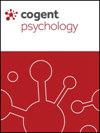Not “just for fun”: Gambling, substance use, and the transdiagnostic role of emotion regulation
IF 1.6
Q2 PSYCHOLOGY, MULTIDISCIPLINARY
引用次数: 1
Abstract
Abstract Models of substance use disorders and more recently pathological gambling underscore stress-relief in maintenance of addictive behaviors. This study examines emotion regulation difficulties as predictors of gambling severity in a community sample with and without substance use disorder symptomatology, hypothesizing that more emotion regulation difficulties, and particularly the reliance on avoidance, would be associated with greater addiction severity both for substances and gambling. Adults regular gamblers were recruited using social media advertising for a survey on emotion regulation, gambling, and substance use. As expected, substance use and gambling showed high co-occurrence. Emotion regulation difficulties predicted severity of gambling but not alcohol use symptoms, although correlations were significant for both disorders. Participants with gambling only and comorbid gambling and substance use showed the greatest reliance on emotional non-acceptance and non-awareness. Poor emotion regulation and avoidance of emotional awareness may contribute to the maintenance of addictions, especially gambling pathology. Improvement of emotional awareness, expression, and acceptance may provide a pathway for reducing such behaviors.不“只是为了好玩”:赌博、物质使用和情绪调节的跨诊断作用
本文章由计算机程序翻译,如有差异,请以英文原文为准。
求助全文
约1分钟内获得全文
求助全文
来源期刊

Cogent Psychology
PSYCHOLOGY, MULTIDISCIPLINARY-
CiteScore
2.90
自引率
0.00%
发文量
75
审稿时长
12 weeks
期刊介绍:
One of the largest multidisciplinary open access journals serving the psychology community, Cogent Psychology provides a home for scientifically sound peer-reviewed research. Part of Taylor & Francis / Routledge, the journal provides authors with fast peer review and publication and, through open access publishing, endeavours to help authors share their knowledge with the world. Cogent Psychology particularly encourages interdisciplinary studies and also accepts replication studies and negative results. Cogent Psychology covers a broad range of topics and welcomes submissions in all areas of psychology, ranging from social psychology to neuroscience, and everything in between. Led by Editor-in-Chief Professor Peter Walla of Webster Private University, Austria, and supported by an expert editorial team from institutions across the globe, Cogent Psychology provides our authors with comprehensive and quality peer review. Rather than accepting manuscripts based on their level of importance or impact, editors assess manuscripts objectively, accepting valid, scientific research with sound rigorous methodology. Article-level metrics let the research speak for itself.
 求助内容:
求助内容: 应助结果提醒方式:
应助结果提醒方式:


